Complex Care: Integrating Nursing Science and Practice for Patients
VerifiedAdded on 2023/06/16
|13
|5284
|417
Report
AI Summary
This report explores the complexities of providing care for a patient named John, who is at the end of life with bowel cancer. It discusses the importance of relationship-centered care and clinical decision-making in managing his condition. The report highlights the need for a holistic approach, considering John's physical, emotional, and social needs, and emphasizes the role of nursing staff in delivering quality, patient-centered care. It also touches on the ethical considerations of maintaining patient confidentiality and the application of various decision-making models and bio-scientific theories, such as the stem cell theory of cancer, in guiding treatment and care strategies. The report concludes by underscoring the importance of ongoing evaluation and adaptation of care plans to ensure the best possible outcomes for patients with complex health needs.
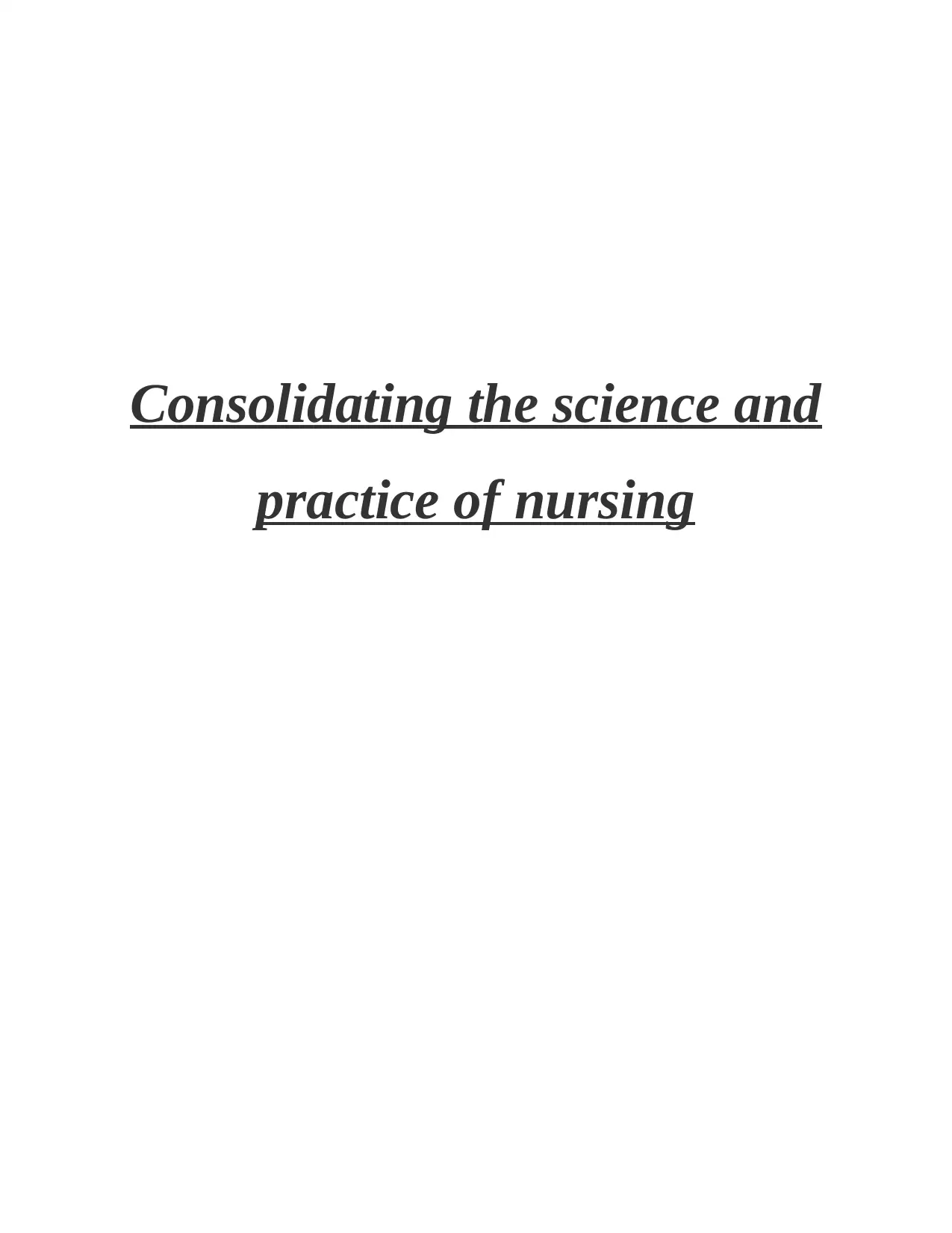
Consolidating the science and
practice of nursing
practice of nursing
Paraphrase This Document
Need a fresh take? Get an instant paraphrase of this document with our AI Paraphraser
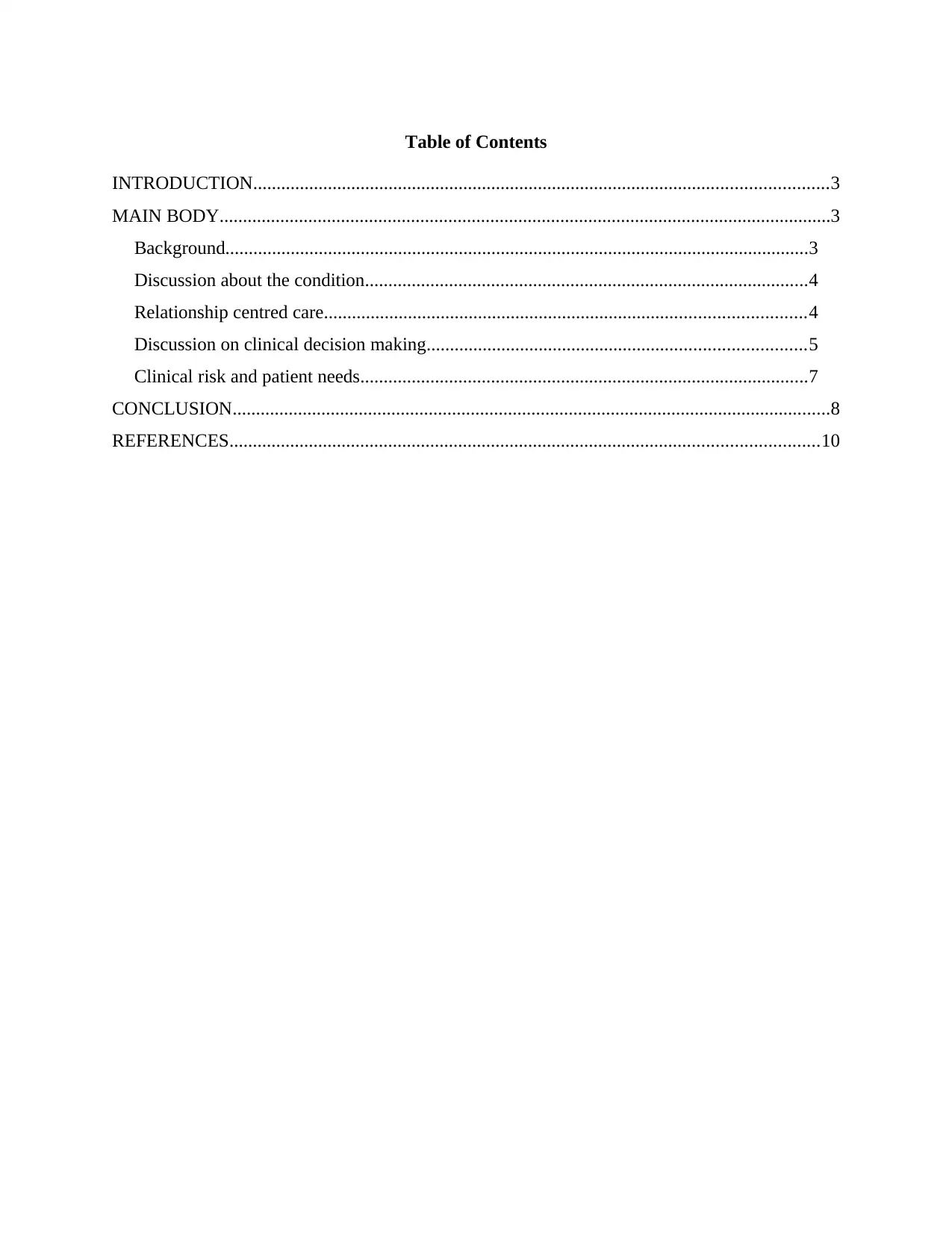
Table of Contents
INTRODUCTION...........................................................................................................................3
MAIN BODY...................................................................................................................................3
Background.............................................................................................................................3
Discussion about the condition...............................................................................................4
Relationship centred care.......................................................................................................4
Discussion on clinical decision making.................................................................................5
Clinical risk and patient needs................................................................................................7
CONCLUSION................................................................................................................................8
REFERENCES..............................................................................................................................10
INTRODUCTION...........................................................................................................................3
MAIN BODY...................................................................................................................................3
Background.............................................................................................................................3
Discussion about the condition...............................................................................................4
Relationship centred care.......................................................................................................4
Discussion on clinical decision making.................................................................................5
Clinical risk and patient needs................................................................................................7
CONCLUSION................................................................................................................................8
REFERENCES..............................................................................................................................10
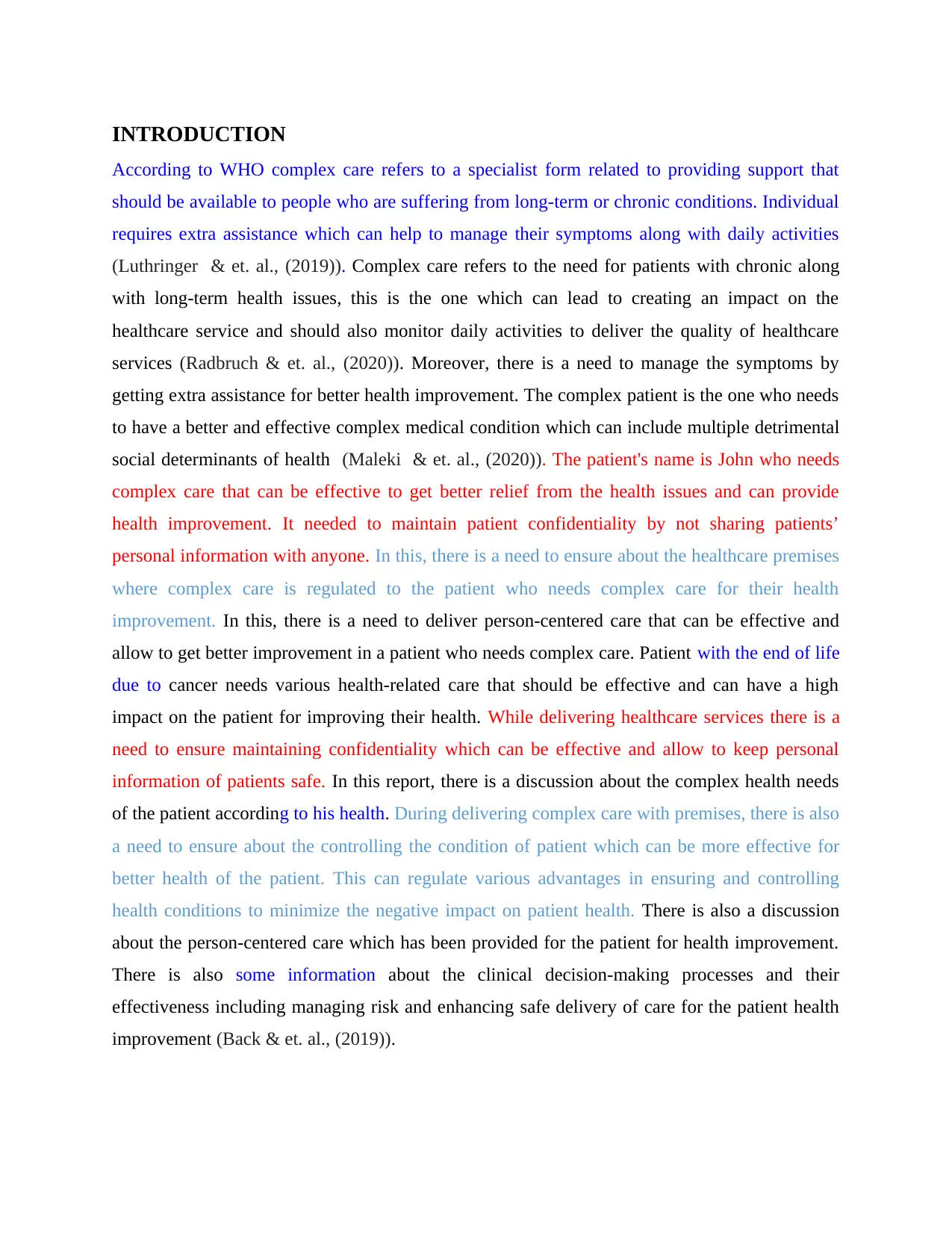
INTRODUCTION
According to WHO complex care refers to a specialist form related to providing support that
should be available to people who are suffering from long-term or chronic conditions. Individual
requires extra assistance which can help to manage their symptoms along with daily activities
(Luthringer & et. al., (2019)). Complex care refers to the need for patients with chronic along
with long-term health issues, this is the one which can lead to creating an impact on the
healthcare service and should also monitor daily activities to deliver the quality of healthcare
services (Radbruch & et. al., (2020)). Moreover, there is a need to manage the symptoms by
getting extra assistance for better health improvement. The complex patient is the one who needs
to have a better and effective complex medical condition which can include multiple detrimental
social determinants of health (Maleki & et. al., (2020)). The patient's name is John who needs
complex care that can be effective to get better relief from the health issues and can provide
health improvement. It needed to maintain patient confidentiality by not sharing patients’
personal information with anyone. In this, there is a need to ensure about the healthcare premises
where complex care is regulated to the patient who needs complex care for their health
improvement. In this, there is a need to deliver person-centered care that can be effective and
allow to get better improvement in a patient who needs complex care. Patient with the end of life
due to cancer needs various health-related care that should be effective and can have a high
impact on the patient for improving their health. While delivering healthcare services there is a
need to ensure maintaining confidentiality which can be effective and allow to keep personal
information of patients safe. In this report, there is a discussion about the complex health needs
of the patient according to his health. During delivering complex care with premises, there is also
a need to ensure about the controlling the condition of patient which can be more effective for
better health of the patient. This can regulate various advantages in ensuring and controlling
health conditions to minimize the negative impact on patient health. There is also a discussion
about the person-centered care which has been provided for the patient for health improvement.
There is also some information about the clinical decision-making processes and their
effectiveness including managing risk and enhancing safe delivery of care for the patient health
improvement (Back & et. al., (2019)).
According to WHO complex care refers to a specialist form related to providing support that
should be available to people who are suffering from long-term or chronic conditions. Individual
requires extra assistance which can help to manage their symptoms along with daily activities
(Luthringer & et. al., (2019)). Complex care refers to the need for patients with chronic along
with long-term health issues, this is the one which can lead to creating an impact on the
healthcare service and should also monitor daily activities to deliver the quality of healthcare
services (Radbruch & et. al., (2020)). Moreover, there is a need to manage the symptoms by
getting extra assistance for better health improvement. The complex patient is the one who needs
to have a better and effective complex medical condition which can include multiple detrimental
social determinants of health (Maleki & et. al., (2020)). The patient's name is John who needs
complex care that can be effective to get better relief from the health issues and can provide
health improvement. It needed to maintain patient confidentiality by not sharing patients’
personal information with anyone. In this, there is a need to ensure about the healthcare premises
where complex care is regulated to the patient who needs complex care for their health
improvement. In this, there is a need to deliver person-centered care that can be effective and
allow to get better improvement in a patient who needs complex care. Patient with the end of life
due to cancer needs various health-related care that should be effective and can have a high
impact on the patient for improving their health. While delivering healthcare services there is a
need to ensure maintaining confidentiality which can be effective and allow to keep personal
information of patients safe. In this report, there is a discussion about the complex health needs
of the patient according to his health. During delivering complex care with premises, there is also
a need to ensure about the controlling the condition of patient which can be more effective for
better health of the patient. This can regulate various advantages in ensuring and controlling
health conditions to minimize the negative impact on patient health. There is also a discussion
about the person-centered care which has been provided for the patient for health improvement.
There is also some information about the clinical decision-making processes and their
effectiveness including managing risk and enhancing safe delivery of care for the patient health
improvement (Back & et. al., (2019)).
⊘ This is a preview!⊘
Do you want full access?
Subscribe today to unlock all pages.

Trusted by 1+ million students worldwide
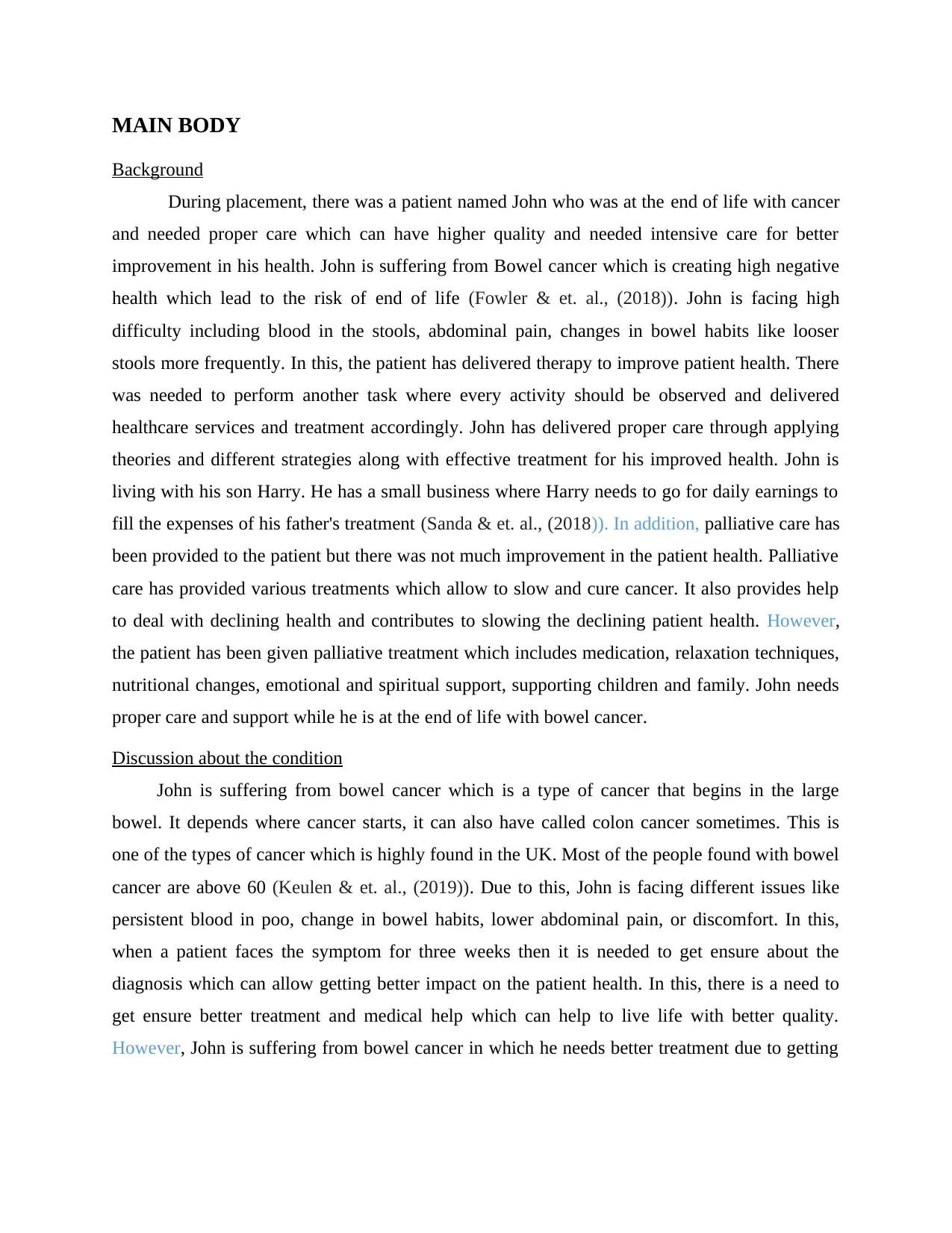
MAIN BODY
Background
During placement, there was a patient named John who was at the end of life with cancer
and needed proper care which can have higher quality and needed intensive care for better
improvement in his health. John is suffering from Bowel cancer which is creating high negative
health which lead to the risk of end of life (Fowler & et. al., (2018)). John is facing high
difficulty including blood in the stools, abdominal pain, changes in bowel habits like looser
stools more frequently. In this, the patient has delivered therapy to improve patient health. There
was needed to perform another task where every activity should be observed and delivered
healthcare services and treatment accordingly. John has delivered proper care through applying
theories and different strategies along with effective treatment for his improved health. John is
living with his son Harry. He has a small business where Harry needs to go for daily earnings to
fill the expenses of his father's treatment (Sanda & et. al., (2018)). In addition, palliative care has
been provided to the patient but there was not much improvement in the patient health. Palliative
care has provided various treatments which allow to slow and cure cancer. It also provides help
to deal with declining health and contributes to slowing the declining patient health. However,
the patient has been given palliative treatment which includes medication, relaxation techniques,
nutritional changes, emotional and spiritual support, supporting children and family. John needs
proper care and support while he is at the end of life with bowel cancer.
Discussion about the condition
John is suffering from bowel cancer which is a type of cancer that begins in the large
bowel. It depends where cancer starts, it can also have called colon cancer sometimes. This is
one of the types of cancer which is highly found in the UK. Most of the people found with bowel
cancer are above 60 (Keulen & et. al., (2019)). Due to this, John is facing different issues like
persistent blood in poo, change in bowel habits, lower abdominal pain, or discomfort. In this,
when a patient faces the symptom for three weeks then it is needed to get ensure about the
diagnosis which can allow getting better impact on the patient health. In this, there is a need to
get ensure better treatment and medical help which can help to live life with better quality.
However, John is suffering from bowel cancer in which he needs better treatment due to getting
Background
During placement, there was a patient named John who was at the end of life with cancer
and needed proper care which can have higher quality and needed intensive care for better
improvement in his health. John is suffering from Bowel cancer which is creating high negative
health which lead to the risk of end of life (Fowler & et. al., (2018)). John is facing high
difficulty including blood in the stools, abdominal pain, changes in bowel habits like looser
stools more frequently. In this, the patient has delivered therapy to improve patient health. There
was needed to perform another task where every activity should be observed and delivered
healthcare services and treatment accordingly. John has delivered proper care through applying
theories and different strategies along with effective treatment for his improved health. John is
living with his son Harry. He has a small business where Harry needs to go for daily earnings to
fill the expenses of his father's treatment (Sanda & et. al., (2018)). In addition, palliative care has
been provided to the patient but there was not much improvement in the patient health. Palliative
care has provided various treatments which allow to slow and cure cancer. It also provides help
to deal with declining health and contributes to slowing the declining patient health. However,
the patient has been given palliative treatment which includes medication, relaxation techniques,
nutritional changes, emotional and spiritual support, supporting children and family. John needs
proper care and support while he is at the end of life with bowel cancer.
Discussion about the condition
John is suffering from bowel cancer which is a type of cancer that begins in the large
bowel. It depends where cancer starts, it can also have called colon cancer sometimes. This is
one of the types of cancer which is highly found in the UK. Most of the people found with bowel
cancer are above 60 (Keulen & et. al., (2019)). Due to this, John is facing different issues like
persistent blood in poo, change in bowel habits, lower abdominal pain, or discomfort. In this,
when a patient faces the symptom for three weeks then it is needed to get ensure about the
diagnosis which can allow getting better impact on the patient health. In this, there is a need to
get ensure better treatment and medical help which can help to live life with better quality.
However, John is suffering from bowel cancer in which he needs better treatment due to getting
Paraphrase This Document
Need a fresh take? Get an instant paraphrase of this document with our AI Paraphraser
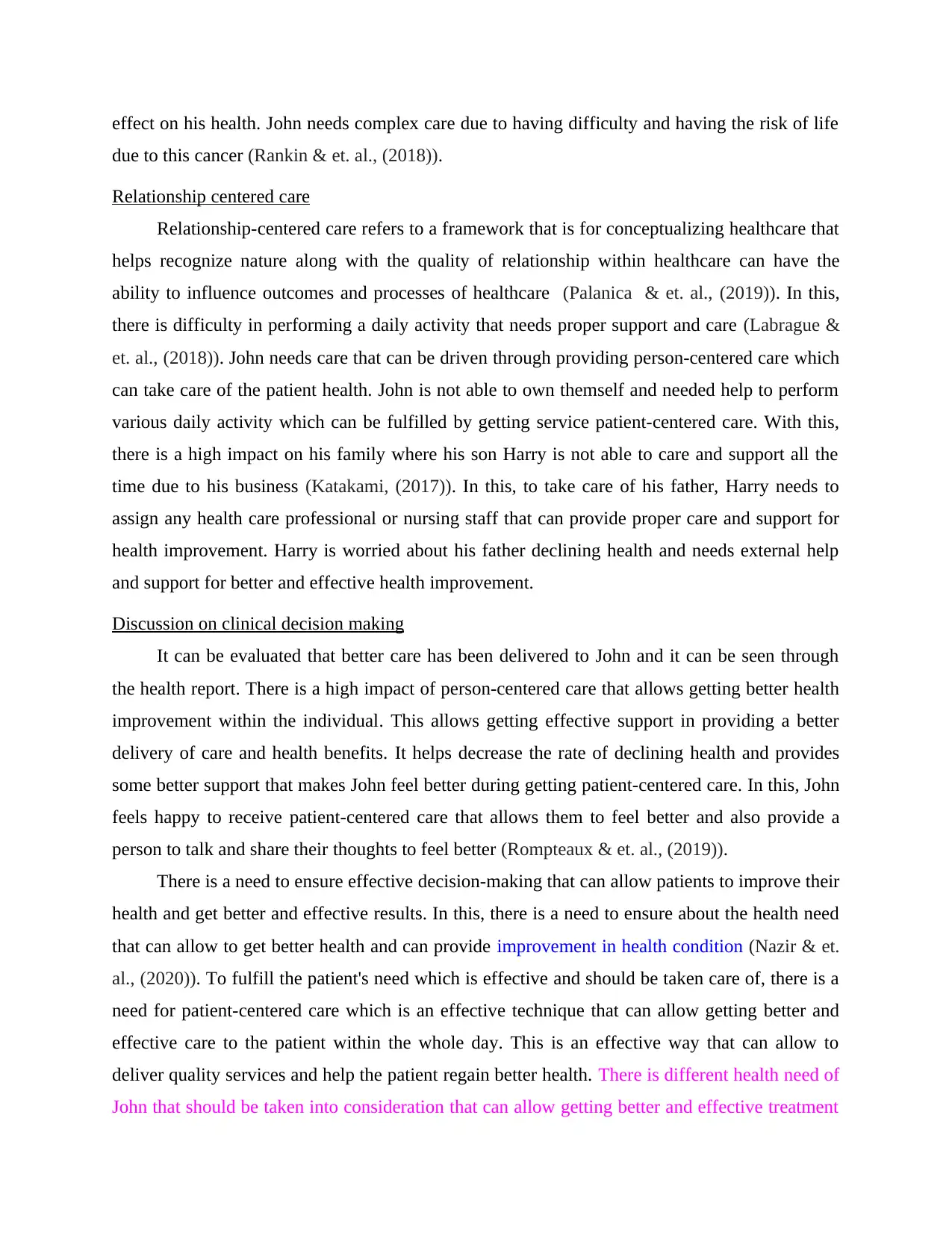
effect on his health. John needs complex care due to having difficulty and having the risk of life
due to this cancer (Rankin & et. al., (2018)).
Relationship centered care
Relationship-centered care refers to a framework that is for conceptualizing healthcare that
helps recognize nature along with the quality of relationship within healthcare can have the
ability to influence outcomes and processes of healthcare (Palanica & et. al., (2019)). In this,
there is difficulty in performing a daily activity that needs proper support and care (Labrague &
et. al., (2018)). John needs care that can be driven through providing person-centered care which
can take care of the patient health. John is not able to own themself and needed help to perform
various daily activity which can be fulfilled by getting service patient-centered care. With this,
there is a high impact on his family where his son Harry is not able to care and support all the
time due to his business (Katakami, (2017)). In this, to take care of his father, Harry needs to
assign any health care professional or nursing staff that can provide proper care and support for
health improvement. Harry is worried about his father declining health and needs external help
and support for better and effective health improvement.
Discussion on clinical decision making
It can be evaluated that better care has been delivered to John and it can be seen through
the health report. There is a high impact of person-centered care that allows getting better health
improvement within the individual. This allows getting effective support in providing a better
delivery of care and health benefits. It helps decrease the rate of declining health and provides
some better support that makes John feel better during getting patient-centered care. In this, John
feels happy to receive patient-centered care that allows them to feel better and also provide a
person to talk and share their thoughts to feel better (Rompteaux & et. al., (2019)).
There is a need to ensure effective decision-making that can allow patients to improve their
health and get better and effective results. In this, there is a need to ensure about the health need
that can allow to get better health and can provide improvement in health condition (Nazir & et.
al., (2020)). To fulfill the patient's need which is effective and should be taken care of, there is a
need for patient-centered care which is an effective technique that can allow getting better and
effective care to the patient within the whole day. This is an effective way that can allow to
deliver quality services and help the patient regain better health. There is different health need of
John that should be taken into consideration that can allow getting better and effective treatment
due to this cancer (Rankin & et. al., (2018)).
Relationship centered care
Relationship-centered care refers to a framework that is for conceptualizing healthcare that
helps recognize nature along with the quality of relationship within healthcare can have the
ability to influence outcomes and processes of healthcare (Palanica & et. al., (2019)). In this,
there is difficulty in performing a daily activity that needs proper support and care (Labrague &
et. al., (2018)). John needs care that can be driven through providing person-centered care which
can take care of the patient health. John is not able to own themself and needed help to perform
various daily activity which can be fulfilled by getting service patient-centered care. With this,
there is a high impact on his family where his son Harry is not able to care and support all the
time due to his business (Katakami, (2017)). In this, to take care of his father, Harry needs to
assign any health care professional or nursing staff that can provide proper care and support for
health improvement. Harry is worried about his father declining health and needs external help
and support for better and effective health improvement.
Discussion on clinical decision making
It can be evaluated that better care has been delivered to John and it can be seen through
the health report. There is a high impact of person-centered care that allows getting better health
improvement within the individual. This allows getting effective support in providing a better
delivery of care and health benefits. It helps decrease the rate of declining health and provides
some better support that makes John feel better during getting patient-centered care. In this, John
feels happy to receive patient-centered care that allows them to feel better and also provide a
person to talk and share their thoughts to feel better (Rompteaux & et. al., (2019)).
There is a need to ensure effective decision-making that can allow patients to improve their
health and get better and effective results. In this, there is a need to ensure about the health need
that can allow to get better health and can provide improvement in health condition (Nazir & et.
al., (2020)). To fulfill the patient's need which is effective and should be taken care of, there is a
need for patient-centered care which is an effective technique that can allow getting better and
effective care to the patient within the whole day. This is an effective way that can allow to
deliver quality services and help the patient regain better health. There is different health need of
John that should be taken into consideration that can allow getting better and effective treatment
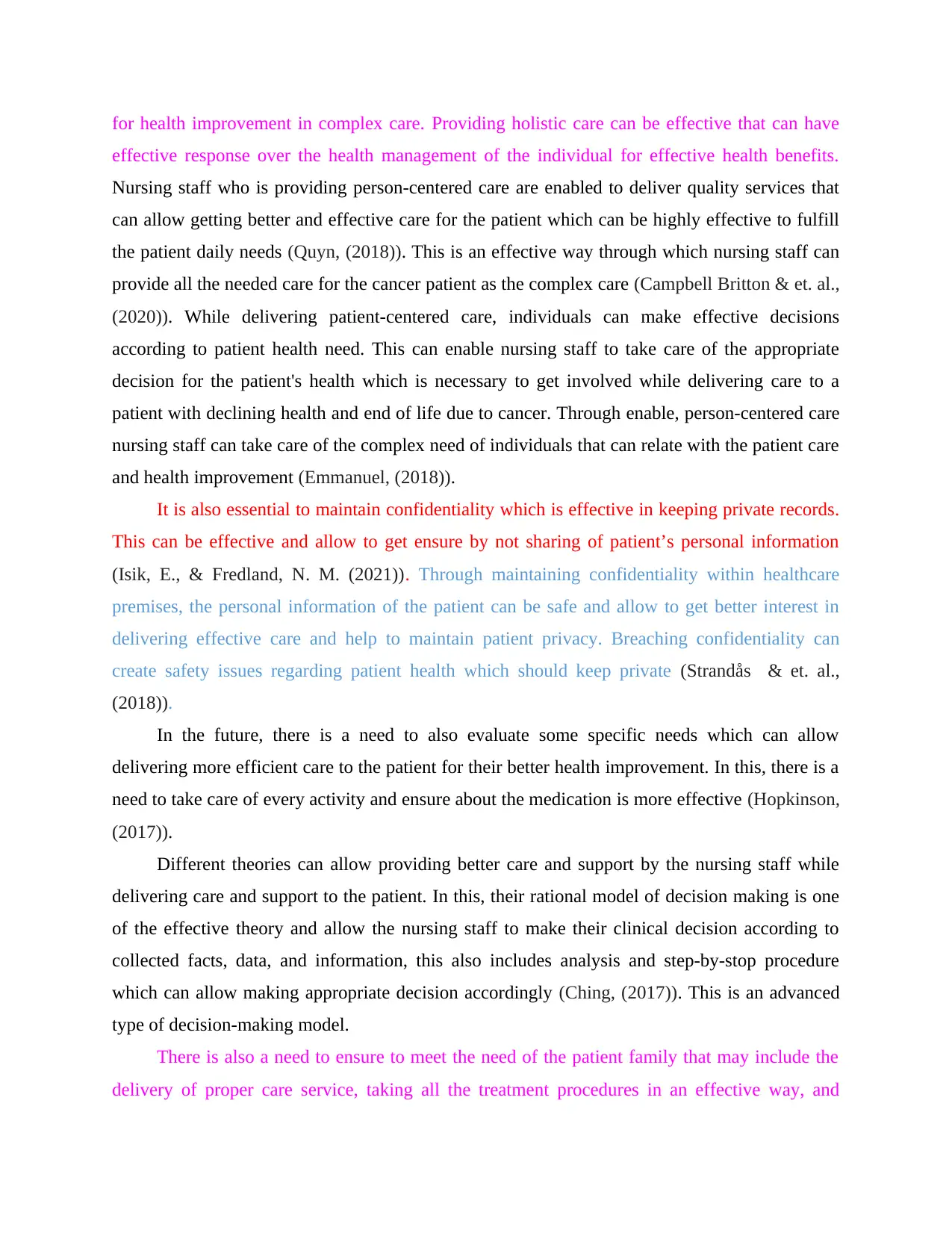
for health improvement in complex care. Providing holistic care can be effective that can have
effective response over the health management of the individual for effective health benefits.
Nursing staff who is providing person-centered care are enabled to deliver quality services that
can allow getting better and effective care for the patient which can be highly effective to fulfill
the patient daily needs (Quyn, (2018)). This is an effective way through which nursing staff can
provide all the needed care for the cancer patient as the complex care (Campbell Britton & et. al.,
(2020)). While delivering patient-centered care, individuals can make effective decisions
according to patient health need. This can enable nursing staff to take care of the appropriate
decision for the patient's health which is necessary to get involved while delivering care to a
patient with declining health and end of life due to cancer. Through enable, person-centered care
nursing staff can take care of the complex need of individuals that can relate with the patient care
and health improvement (Emmanuel, (2018)).
It is also essential to maintain confidentiality which is effective in keeping private records.
This can be effective and allow to get ensure by not sharing of patient’s personal information
(Isik, E., & Fredland, N. M. (2021)). Through maintaining confidentiality within healthcare
premises, the personal information of the patient can be safe and allow to get better interest in
delivering effective care and help to maintain patient privacy. Breaching confidentiality can
create safety issues regarding patient health which should keep private (Strandås & et. al.,
(2018)).
In the future, there is a need to also evaluate some specific needs which can allow
delivering more efficient care to the patient for their better health improvement. In this, there is a
need to take care of every activity and ensure about the medication is more effective (Hopkinson,
(2017)).
Different theories can allow providing better care and support by the nursing staff while
delivering care and support to the patient. In this, their rational model of decision making is one
of the effective theory and allow the nursing staff to make their clinical decision according to
collected facts, data, and information, this also includes analysis and step-by-stop procedure
which can allow making appropriate decision accordingly (Ching, (2017)). This is an advanced
type of decision-making model.
There is also a need to ensure to meet the need of the patient family that may include the
delivery of proper care service, taking all the treatment procedures in an effective way, and
effective response over the health management of the individual for effective health benefits.
Nursing staff who is providing person-centered care are enabled to deliver quality services that
can allow getting better and effective care for the patient which can be highly effective to fulfill
the patient daily needs (Quyn, (2018)). This is an effective way through which nursing staff can
provide all the needed care for the cancer patient as the complex care (Campbell Britton & et. al.,
(2020)). While delivering patient-centered care, individuals can make effective decisions
according to patient health need. This can enable nursing staff to take care of the appropriate
decision for the patient's health which is necessary to get involved while delivering care to a
patient with declining health and end of life due to cancer. Through enable, person-centered care
nursing staff can take care of the complex need of individuals that can relate with the patient care
and health improvement (Emmanuel, (2018)).
It is also essential to maintain confidentiality which is effective in keeping private records.
This can be effective and allow to get ensure by not sharing of patient’s personal information
(Isik, E., & Fredland, N. M. (2021)). Through maintaining confidentiality within healthcare
premises, the personal information of the patient can be safe and allow to get better interest in
delivering effective care and help to maintain patient privacy. Breaching confidentiality can
create safety issues regarding patient health which should keep private (Strandås & et. al.,
(2018)).
In the future, there is a need to also evaluate some specific needs which can allow
delivering more efficient care to the patient for their better health improvement. In this, there is a
need to take care of every activity and ensure about the medication is more effective (Hopkinson,
(2017)).
Different theories can allow providing better care and support by the nursing staff while
delivering care and support to the patient. In this, their rational model of decision making is one
of the effective theory and allow the nursing staff to make their clinical decision according to
collected facts, data, and information, this also includes analysis and step-by-stop procedure
which can allow making appropriate decision accordingly (Ching, (2017)). This is an advanced
type of decision-making model.
There is also a need to ensure to meet the need of the patient family that may include the
delivery of proper care service, taking all the treatment procedures in an effective way, and
⊘ This is a preview!⊘
Do you want full access?
Subscribe today to unlock all pages.

Trusted by 1+ million students worldwide
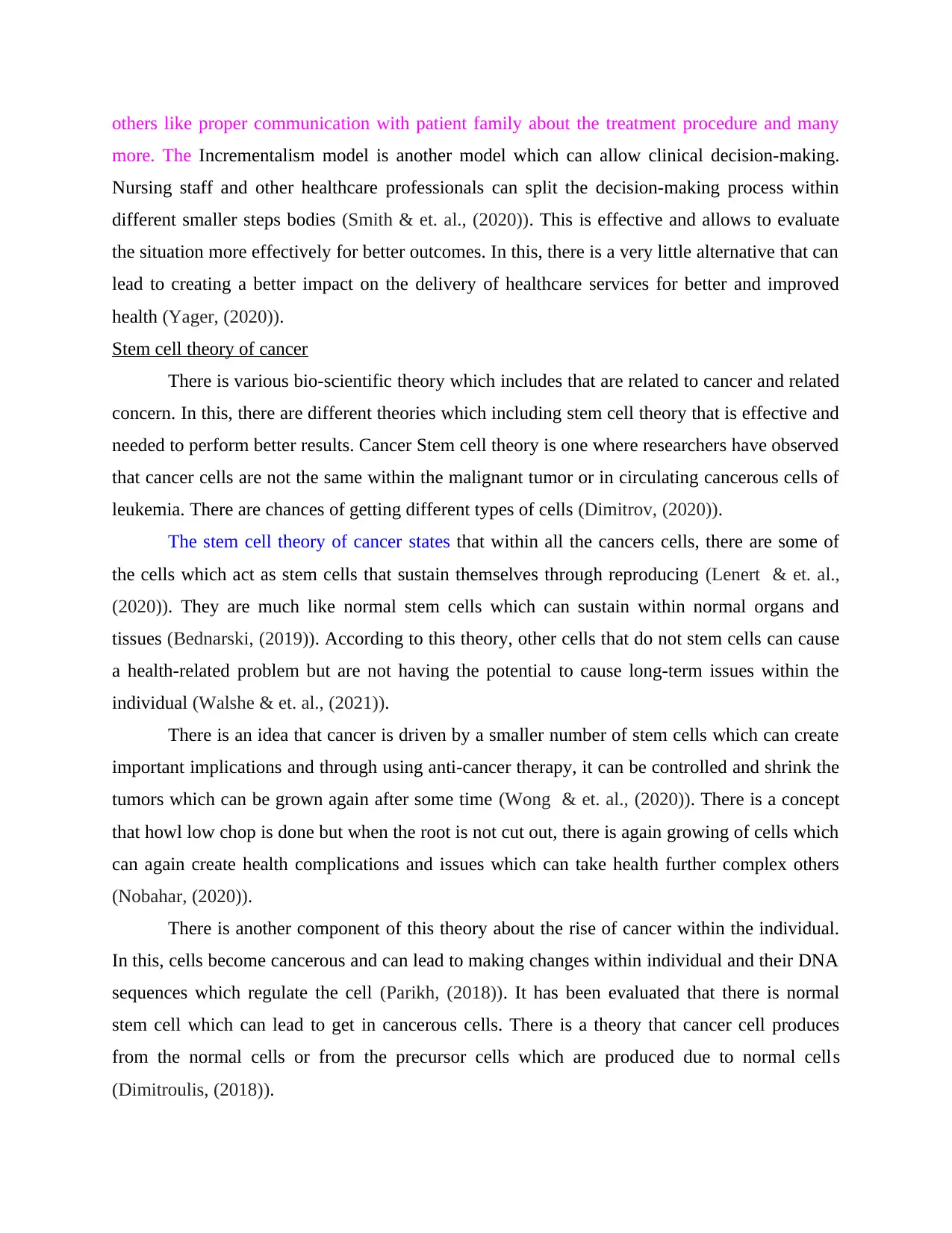
others like proper communication with patient family about the treatment procedure and many
more. The Incrementalism model is another model which can allow clinical decision-making.
Nursing staff and other healthcare professionals can split the decision-making process within
different smaller steps bodies (Smith & et. al., (2020)). This is effective and allows to evaluate
the situation more effectively for better outcomes. In this, there is a very little alternative that can
lead to creating a better impact on the delivery of healthcare services for better and improved
health (Yager, (2020)).
Stem cell theory of cancer
There is various bio-scientific theory which includes that are related to cancer and related
concern. In this, there are different theories which including stem cell theory that is effective and
needed to perform better results. Cancer Stem cell theory is one where researchers have observed
that cancer cells are not the same within the malignant tumor or in circulating cancerous cells of
leukemia. There are chances of getting different types of cells (Dimitrov, (2020)).
The stem cell theory of cancer states that within all the cancers cells, there are some of
the cells which act as stem cells that sustain themselves through reproducing (Lenert & et. al.,
(2020)). They are much like normal stem cells which can sustain within normal organs and
tissues (Bednarski, (2019)). According to this theory, other cells that do not stem cells can cause
a health-related problem but are not having the potential to cause long-term issues within the
individual (Walshe & et. al., (2021)).
There is an idea that cancer is driven by a smaller number of stem cells which can create
important implications and through using anti-cancer therapy, it can be controlled and shrink the
tumors which can be grown again after some time (Wong & et. al., (2020)). There is a concept
that howl low chop is done but when the root is not cut out, there is again growing of cells which
can again create health complications and issues which can take health further complex others
(Nobahar, (2020)).
There is another component of this theory about the rise of cancer within the individual.
In this, cells become cancerous and can lead to making changes within individual and their DNA
sequences which regulate the cell (Parikh, (2018)). It has been evaluated that there is normal
stem cell which can lead to get in cancerous cells. There is a theory that cancer cell produces
from the normal cells or from the precursor cells which are produced due to normal cells
(Dimitroulis, (2018)).
more. The Incrementalism model is another model which can allow clinical decision-making.
Nursing staff and other healthcare professionals can split the decision-making process within
different smaller steps bodies (Smith & et. al., (2020)). This is effective and allows to evaluate
the situation more effectively for better outcomes. In this, there is a very little alternative that can
lead to creating a better impact on the delivery of healthcare services for better and improved
health (Yager, (2020)).
Stem cell theory of cancer
There is various bio-scientific theory which includes that are related to cancer and related
concern. In this, there are different theories which including stem cell theory that is effective and
needed to perform better results. Cancer Stem cell theory is one where researchers have observed
that cancer cells are not the same within the malignant tumor or in circulating cancerous cells of
leukemia. There are chances of getting different types of cells (Dimitrov, (2020)).
The stem cell theory of cancer states that within all the cancers cells, there are some of
the cells which act as stem cells that sustain themselves through reproducing (Lenert & et. al.,
(2020)). They are much like normal stem cells which can sustain within normal organs and
tissues (Bednarski, (2019)). According to this theory, other cells that do not stem cells can cause
a health-related problem but are not having the potential to cause long-term issues within the
individual (Walshe & et. al., (2021)).
There is an idea that cancer is driven by a smaller number of stem cells which can create
important implications and through using anti-cancer therapy, it can be controlled and shrink the
tumors which can be grown again after some time (Wong & et. al., (2020)). There is a concept
that howl low chop is done but when the root is not cut out, there is again growing of cells which
can again create health complications and issues which can take health further complex others
(Nobahar, (2020)).
There is another component of this theory about the rise of cancer within the individual.
In this, cells become cancerous and can lead to making changes within individual and their DNA
sequences which regulate the cell (Parikh, (2018)). It has been evaluated that there is normal
stem cell which can lead to get in cancerous cells. There is a theory that cancer cell produces
from the normal cells or from the precursor cells which are produced due to normal cells
(Dimitroulis, (2018)).
Paraphrase This Document
Need a fresh take? Get an instant paraphrase of this document with our AI Paraphraser
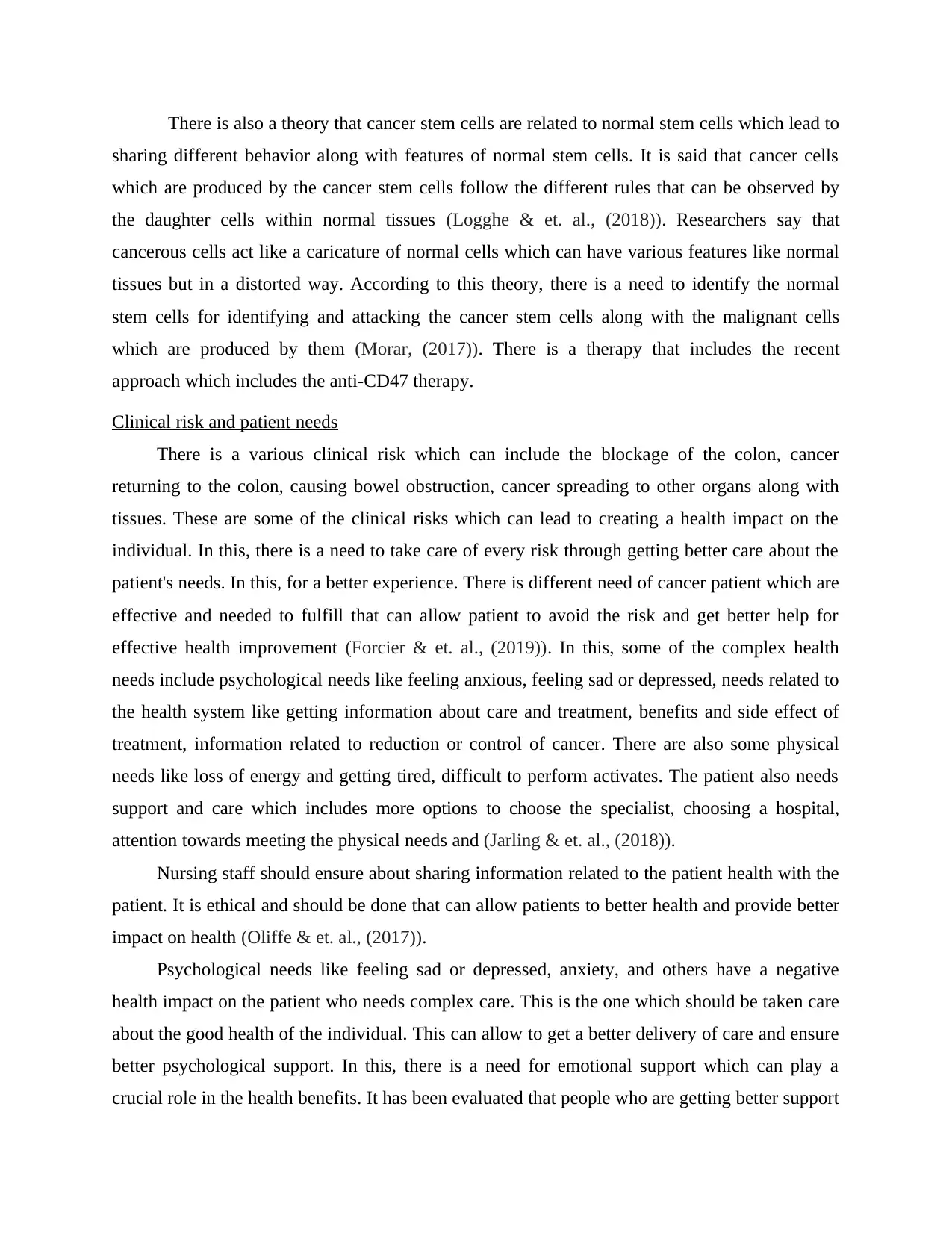
There is also a theory that cancer stem cells are related to normal stem cells which lead to
sharing different behavior along with features of normal stem cells. It is said that cancer cells
which are produced by the cancer stem cells follow the different rules that can be observed by
the daughter cells within normal tissues (Logghe & et. al., (2018)). Researchers say that
cancerous cells act like a caricature of normal cells which can have various features like normal
tissues but in a distorted way. According to this theory, there is a need to identify the normal
stem cells for identifying and attacking the cancer stem cells along with the malignant cells
which are produced by them (Morar, (2017)). There is a therapy that includes the recent
approach which includes the anti-CD47 therapy.
Clinical risk and patient needs
There is a various clinical risk which can include the blockage of the colon, cancer
returning to the colon, causing bowel obstruction, cancer spreading to other organs along with
tissues. These are some of the clinical risks which can lead to creating a health impact on the
individual. In this, there is a need to take care of every risk through getting better care about the
patient's needs. In this, for a better experience. There is different need of cancer patient which are
effective and needed to fulfill that can allow patient to avoid the risk and get better help for
effective health improvement (Forcier & et. al., (2019)). In this, some of the complex health
needs include psychological needs like feeling anxious, feeling sad or depressed, needs related to
the health system like getting information about care and treatment, benefits and side effect of
treatment, information related to reduction or control of cancer. There are also some physical
needs like loss of energy and getting tired, difficult to perform activates. The patient also needs
support and care which includes more options to choose the specialist, choosing a hospital,
attention towards meeting the physical needs and (Jarling & et. al., (2018)).
Nursing staff should ensure about sharing information related to the patient health with the
patient. It is ethical and should be done that can allow patients to better health and provide better
impact on health (Oliffe & et. al., (2017)).
Psychological needs like feeling sad or depressed, anxiety, and others have a negative
health impact on the patient who needs complex care. This is the one which should be taken care
about the good health of the individual. This can allow to get a better delivery of care and ensure
better psychological support. In this, there is a need for emotional support which can play a
crucial role in the health benefits. It has been evaluated that people who are getting better support
sharing different behavior along with features of normal stem cells. It is said that cancer cells
which are produced by the cancer stem cells follow the different rules that can be observed by
the daughter cells within normal tissues (Logghe & et. al., (2018)). Researchers say that
cancerous cells act like a caricature of normal cells which can have various features like normal
tissues but in a distorted way. According to this theory, there is a need to identify the normal
stem cells for identifying and attacking the cancer stem cells along with the malignant cells
which are produced by them (Morar, (2017)). There is a therapy that includes the recent
approach which includes the anti-CD47 therapy.
Clinical risk and patient needs
There is a various clinical risk which can include the blockage of the colon, cancer
returning to the colon, causing bowel obstruction, cancer spreading to other organs along with
tissues. These are some of the clinical risks which can lead to creating a health impact on the
individual. In this, there is a need to take care of every risk through getting better care about the
patient's needs. In this, for a better experience. There is different need of cancer patient which are
effective and needed to fulfill that can allow patient to avoid the risk and get better help for
effective health improvement (Forcier & et. al., (2019)). In this, some of the complex health
needs include psychological needs like feeling anxious, feeling sad or depressed, needs related to
the health system like getting information about care and treatment, benefits and side effect of
treatment, information related to reduction or control of cancer. There are also some physical
needs like loss of energy and getting tired, difficult to perform activates. The patient also needs
support and care which includes more options to choose the specialist, choosing a hospital,
attention towards meeting the physical needs and (Jarling & et. al., (2018)).
Nursing staff should ensure about sharing information related to the patient health with the
patient. It is ethical and should be done that can allow patients to better health and provide better
impact on health (Oliffe & et. al., (2017)).
Psychological needs like feeling sad or depressed, anxiety, and others have a negative
health impact on the patient who needs complex care. This is the one which should be taken care
about the good health of the individual. This can allow to get a better delivery of care and ensure
better psychological support. In this, there is a need for emotional support which can play a
crucial role in the health benefits. It has been evaluated that people who are getting better support
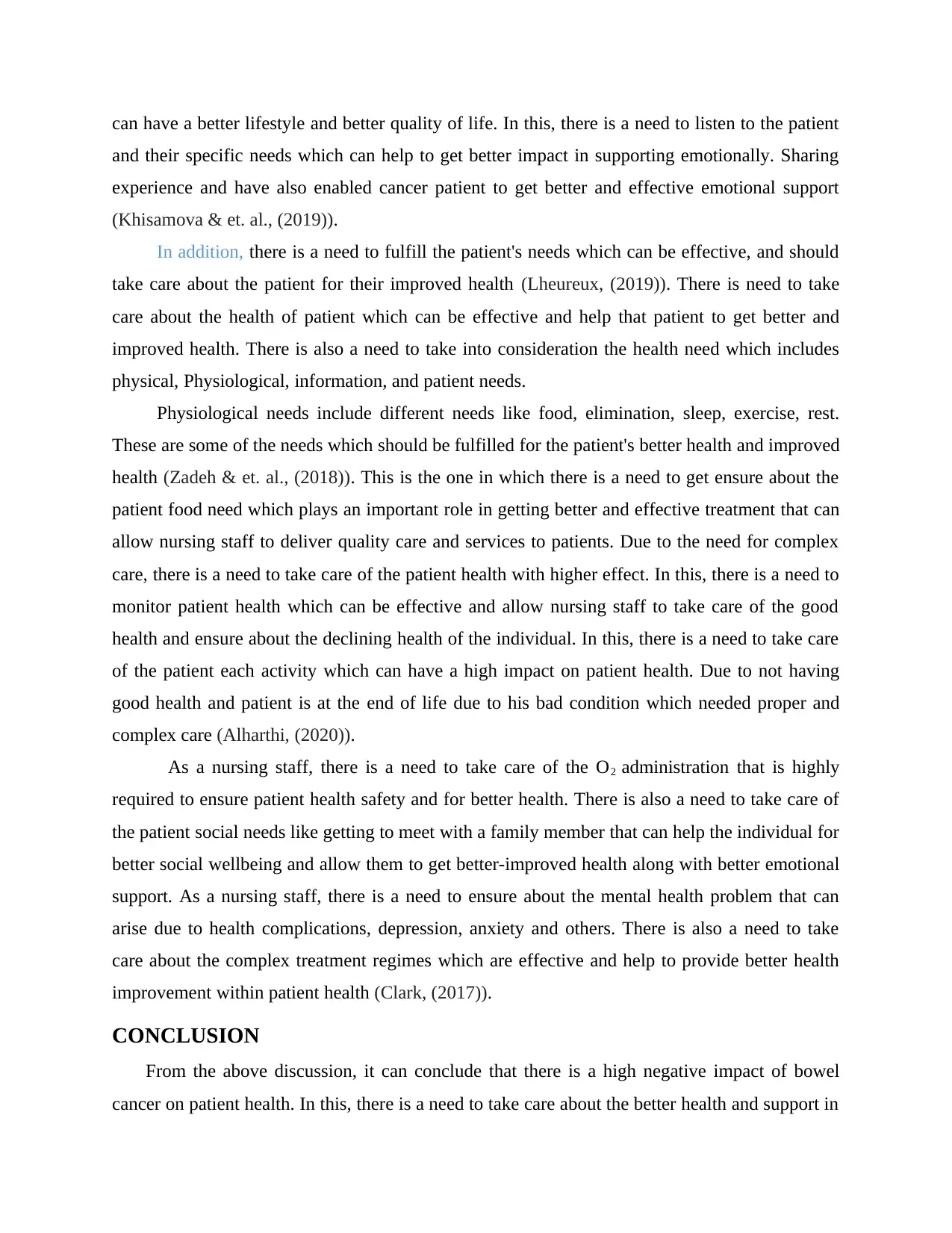
can have a better lifestyle and better quality of life. In this, there is a need to listen to the patient
and their specific needs which can help to get better impact in supporting emotionally. Sharing
experience and have also enabled cancer patient to get better and effective emotional support
(Khisamova & et. al., (2019)).
In addition, there is a need to fulfill the patient's needs which can be effective, and should
take care about the patient for their improved health (Lheureux, (2019)). There is need to take
care about the health of patient which can be effective and help that patient to get better and
improved health. There is also a need to take into consideration the health need which includes
physical, Physiological, information, and patient needs.
Physiological needs include different needs like food, elimination, sleep, exercise, rest.
These are some of the needs which should be fulfilled for the patient's better health and improved
health (Zadeh & et. al., (2018)). This is the one in which there is a need to get ensure about the
patient food need which plays an important role in getting better and effective treatment that can
allow nursing staff to deliver quality care and services to patients. Due to the need for complex
care, there is a need to take care of the patient health with higher effect. In this, there is a need to
monitor patient health which can be effective and allow nursing staff to take care of the good
health and ensure about the declining health of the individual. In this, there is a need to take care
of the patient each activity which can have a high impact on patient health. Due to not having
good health and patient is at the end of life due to his bad condition which needed proper and
complex care (Alharthi, (2020)).
As a nursing staff, there is a need to take care of the O2 administration that is highly
required to ensure patient health safety and for better health. There is also a need to take care of
the patient social needs like getting to meet with a family member that can help the individual for
better social wellbeing and allow them to get better-improved health along with better emotional
support. As a nursing staff, there is a need to ensure about the mental health problem that can
arise due to health complications, depression, anxiety and others. There is also a need to take
care about the complex treatment regimes which are effective and help to provide better health
improvement within patient health (Clark, (2017)).
CONCLUSION
From the above discussion, it can conclude that there is a high negative impact of bowel
cancer on patient health. In this, there is a need to take care about the better health and support in
and their specific needs which can help to get better impact in supporting emotionally. Sharing
experience and have also enabled cancer patient to get better and effective emotional support
(Khisamova & et. al., (2019)).
In addition, there is a need to fulfill the patient's needs which can be effective, and should
take care about the patient for their improved health (Lheureux, (2019)). There is need to take
care about the health of patient which can be effective and help that patient to get better and
improved health. There is also a need to take into consideration the health need which includes
physical, Physiological, information, and patient needs.
Physiological needs include different needs like food, elimination, sleep, exercise, rest.
These are some of the needs which should be fulfilled for the patient's better health and improved
health (Zadeh & et. al., (2018)). This is the one in which there is a need to get ensure about the
patient food need which plays an important role in getting better and effective treatment that can
allow nursing staff to deliver quality care and services to patients. Due to the need for complex
care, there is a need to take care of the patient health with higher effect. In this, there is a need to
monitor patient health which can be effective and allow nursing staff to take care of the good
health and ensure about the declining health of the individual. In this, there is a need to take care
of the patient each activity which can have a high impact on patient health. Due to not having
good health and patient is at the end of life due to his bad condition which needed proper and
complex care (Alharthi, (2020)).
As a nursing staff, there is a need to take care of the O2 administration that is highly
required to ensure patient health safety and for better health. There is also a need to take care of
the patient social needs like getting to meet with a family member that can help the individual for
better social wellbeing and allow them to get better-improved health along with better emotional
support. As a nursing staff, there is a need to ensure about the mental health problem that can
arise due to health complications, depression, anxiety and others. There is also a need to take
care about the complex treatment regimes which are effective and help to provide better health
improvement within patient health (Clark, (2017)).
CONCLUSION
From the above discussion, it can conclude that there is a high negative impact of bowel
cancer on patient health. In this, there is a need to take care about the better health and support in
⊘ This is a preview!⊘
Do you want full access?
Subscribe today to unlock all pages.

Trusted by 1+ million students worldwide
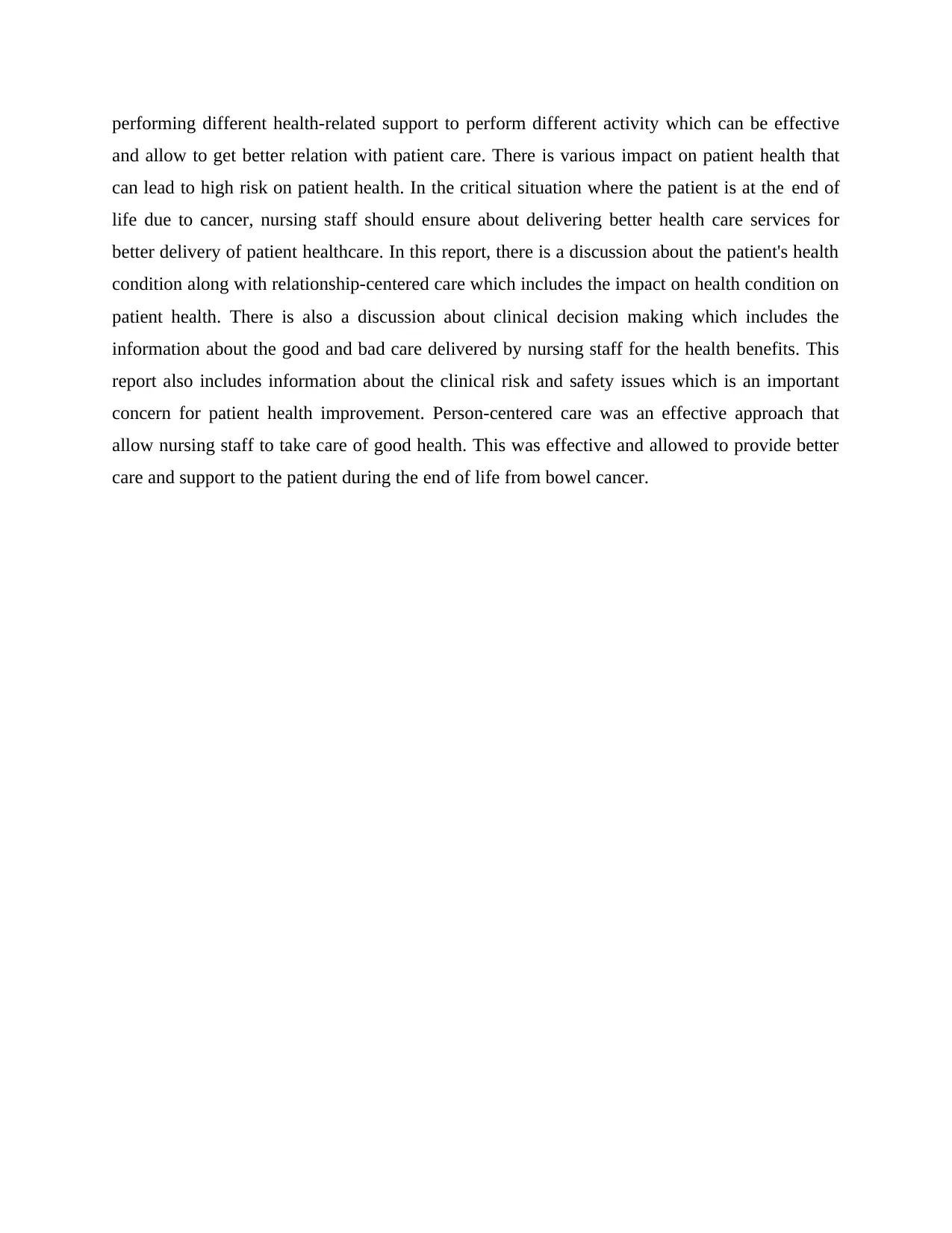
performing different health-related support to perform different activity which can be effective
and allow to get better relation with patient care. There is various impact on patient health that
can lead to high risk on patient health. In the critical situation where the patient is at the end of
life due to cancer, nursing staff should ensure about delivering better health care services for
better delivery of patient healthcare. In this report, there is a discussion about the patient's health
condition along with relationship-centered care which includes the impact on health condition on
patient health. There is also a discussion about clinical decision making which includes the
information about the good and bad care delivered by nursing staff for the health benefits. This
report also includes information about the clinical risk and safety issues which is an important
concern for patient health improvement. Person-centered care was an effective approach that
allow nursing staff to take care of good health. This was effective and allowed to provide better
care and support to the patient during the end of life from bowel cancer.
and allow to get better relation with patient care. There is various impact on patient health that
can lead to high risk on patient health. In the critical situation where the patient is at the end of
life due to cancer, nursing staff should ensure about delivering better health care services for
better delivery of patient healthcare. In this report, there is a discussion about the patient's health
condition along with relationship-centered care which includes the impact on health condition on
patient health. There is also a discussion about clinical decision making which includes the
information about the good and bad care delivered by nursing staff for the health benefits. This
report also includes information about the clinical risk and safety issues which is an important
concern for patient health improvement. Person-centered care was an effective approach that
allow nursing staff to take care of good health. This was effective and allowed to provide better
care and support to the patient during the end of life from bowel cancer.
Paraphrase This Document
Need a fresh take? Get an instant paraphrase of this document with our AI Paraphraser
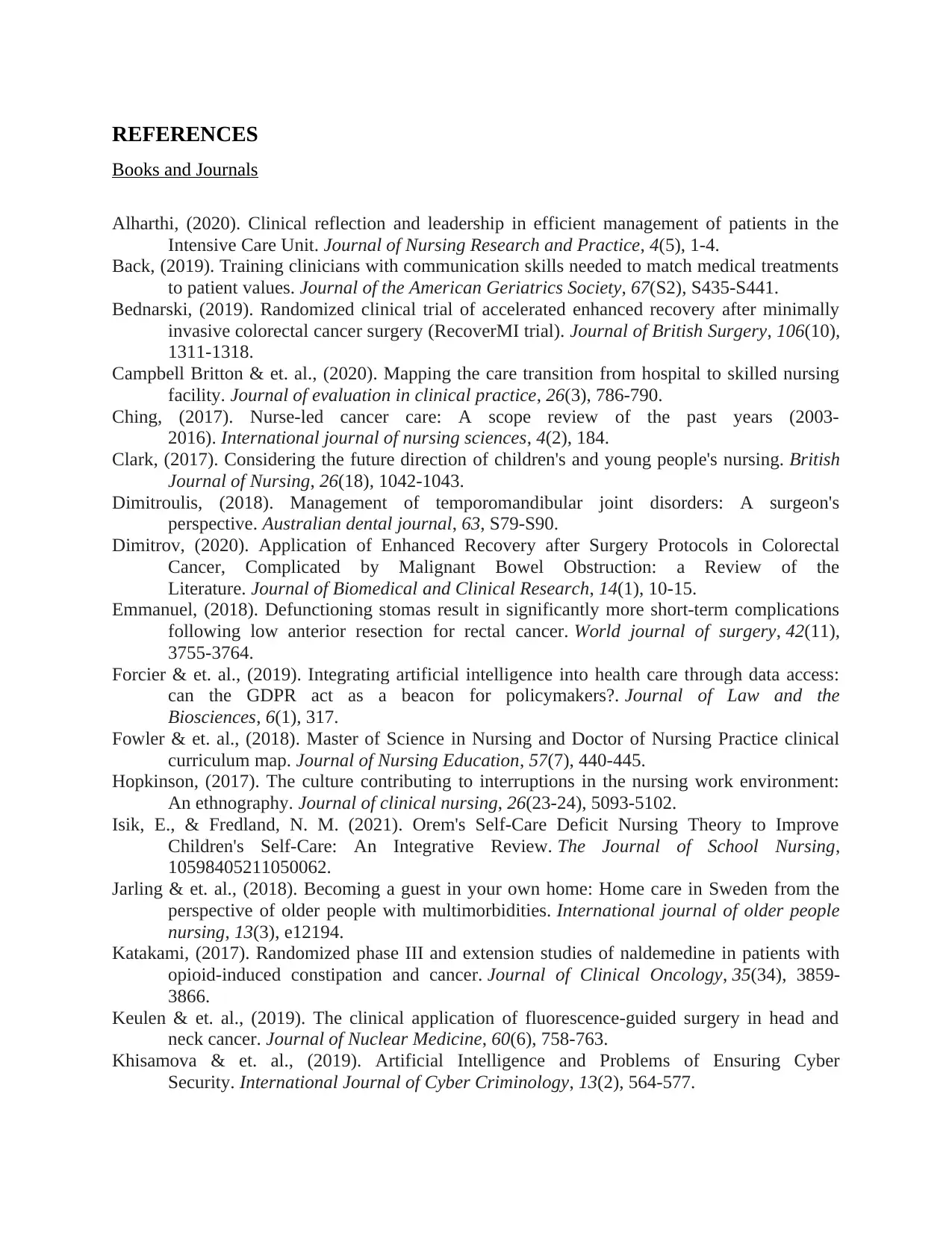
REFERENCES
Books and Journals
Alharthi, (2020). Clinical reflection and leadership in efficient management of patients in the
Intensive Care Unit. Journal of Nursing Research and Practice, 4(5), 1-4.
Back, (2019). Training clinicians with communication skills needed to match medical treatments
to patient values. Journal of the American Geriatrics Society, 67(S2), S435-S441.
Bednarski, (2019). Randomized clinical trial of accelerated enhanced recovery after minimally
invasive colorectal cancer surgery (RecoverMI trial). Journal of British Surgery, 106(10),
1311-1318.
Campbell Britton & et. al., (2020). Mapping the care transition from hospital to skilled nursing
facility. Journal of evaluation in clinical practice, 26(3), 786-790.
Ching, (2017). Nurse-led cancer care: A scope review of the past years (2003-
2016). International journal of nursing sciences, 4(2), 184.
Clark, (2017). Considering the future direction of children's and young people's nursing. British
Journal of Nursing, 26(18), 1042-1043.
Dimitroulis, (2018). Management of temporomandibular joint disorders: A surgeon's
perspective. Australian dental journal, 63, S79-S90.
Dimitrov, (2020). Application of Enhanced Recovery after Surgery Protocols in Colorectal
Cancer, Complicated by Malignant Bowel Obstruction: a Review of the
Literature. Journal of Biomedical and Clinical Research, 14(1), 10-15.
Emmanuel, (2018). Defunctioning stomas result in significantly more short-term complications
following low anterior resection for rectal cancer. World journal of surgery, 42(11),
3755-3764.
Forcier & et. al., (2019). Integrating artificial intelligence into health care through data access:
can the GDPR act as a beacon for policymakers?. Journal of Law and the
Biosciences, 6(1), 317.
Fowler & et. al., (2018). Master of Science in Nursing and Doctor of Nursing Practice clinical
curriculum map. Journal of Nursing Education, 57(7), 440-445.
Hopkinson, (2017). The culture contributing to interruptions in the nursing work environment:
An ethnography. Journal of clinical nursing, 26(23-24), 5093-5102.
Isik, E., & Fredland, N. M. (2021). Orem's Self-Care Deficit Nursing Theory to Improve
Children's Self-Care: An Integrative Review. The Journal of School Nursing,
10598405211050062.
Jarling & et. al., (2018). Becoming a guest in your own home: Home care in Sweden from the
perspective of older people with multimorbidities. International journal of older people
nursing, 13(3), e12194.
Katakami, (2017). Randomized phase III and extension studies of naldemedine in patients with
opioid-induced constipation and cancer. Journal of Clinical Oncology, 35(34), 3859-
3866.
Keulen & et. al., (2019). The clinical application of fluorescence-guided surgery in head and
neck cancer. Journal of Nuclear Medicine, 60(6), 758-763.
Khisamova & et. al., (2019). Artificial Intelligence and Problems of Ensuring Cyber
Security. International Journal of Cyber Criminology, 13(2), 564-577.
Books and Journals
Alharthi, (2020). Clinical reflection and leadership in efficient management of patients in the
Intensive Care Unit. Journal of Nursing Research and Practice, 4(5), 1-4.
Back, (2019). Training clinicians with communication skills needed to match medical treatments
to patient values. Journal of the American Geriatrics Society, 67(S2), S435-S441.
Bednarski, (2019). Randomized clinical trial of accelerated enhanced recovery after minimally
invasive colorectal cancer surgery (RecoverMI trial). Journal of British Surgery, 106(10),
1311-1318.
Campbell Britton & et. al., (2020). Mapping the care transition from hospital to skilled nursing
facility. Journal of evaluation in clinical practice, 26(3), 786-790.
Ching, (2017). Nurse-led cancer care: A scope review of the past years (2003-
2016). International journal of nursing sciences, 4(2), 184.
Clark, (2017). Considering the future direction of children's and young people's nursing. British
Journal of Nursing, 26(18), 1042-1043.
Dimitroulis, (2018). Management of temporomandibular joint disorders: A surgeon's
perspective. Australian dental journal, 63, S79-S90.
Dimitrov, (2020). Application of Enhanced Recovery after Surgery Protocols in Colorectal
Cancer, Complicated by Malignant Bowel Obstruction: a Review of the
Literature. Journal of Biomedical and Clinical Research, 14(1), 10-15.
Emmanuel, (2018). Defunctioning stomas result in significantly more short-term complications
following low anterior resection for rectal cancer. World journal of surgery, 42(11),
3755-3764.
Forcier & et. al., (2019). Integrating artificial intelligence into health care through data access:
can the GDPR act as a beacon for policymakers?. Journal of Law and the
Biosciences, 6(1), 317.
Fowler & et. al., (2018). Master of Science in Nursing and Doctor of Nursing Practice clinical
curriculum map. Journal of Nursing Education, 57(7), 440-445.
Hopkinson, (2017). The culture contributing to interruptions in the nursing work environment:
An ethnography. Journal of clinical nursing, 26(23-24), 5093-5102.
Isik, E., & Fredland, N. M. (2021). Orem's Self-Care Deficit Nursing Theory to Improve
Children's Self-Care: An Integrative Review. The Journal of School Nursing,
10598405211050062.
Jarling & et. al., (2018). Becoming a guest in your own home: Home care in Sweden from the
perspective of older people with multimorbidities. International journal of older people
nursing, 13(3), e12194.
Katakami, (2017). Randomized phase III and extension studies of naldemedine in patients with
opioid-induced constipation and cancer. Journal of Clinical Oncology, 35(34), 3859-
3866.
Keulen & et. al., (2019). The clinical application of fluorescence-guided surgery in head and
neck cancer. Journal of Nuclear Medicine, 60(6), 758-763.
Khisamova & et. al., (2019). Artificial Intelligence and Problems of Ensuring Cyber
Security. International Journal of Cyber Criminology, 13(2), 564-577.
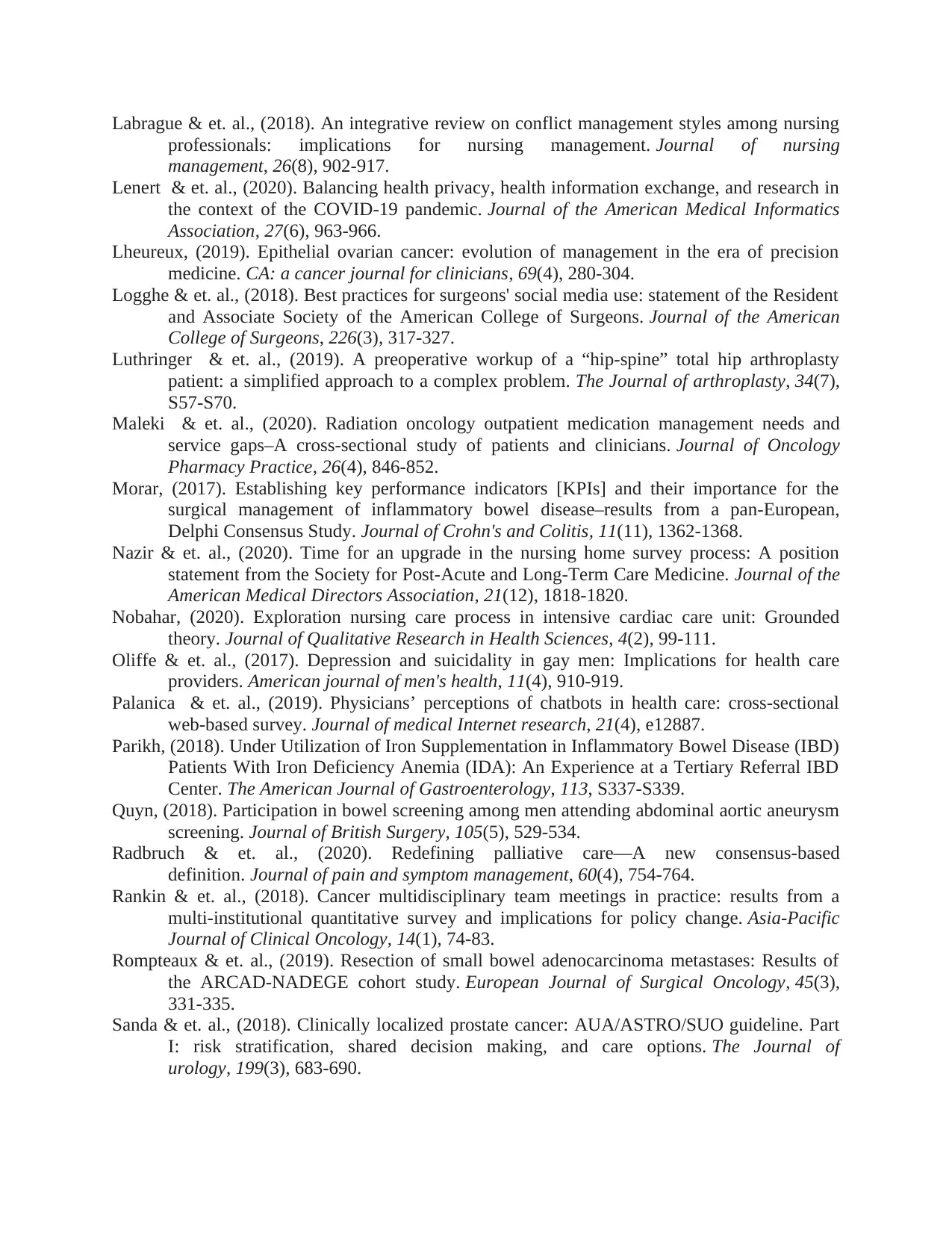
Labrague & et. al., (2018). An integrative review on conflict management styles among nursing
professionals: implications for nursing management. Journal of nursing
management, 26(8), 902-917.
Lenert & et. al., (2020). Balancing health privacy, health information exchange, and research in
the context of the COVID-19 pandemic. Journal of the American Medical Informatics
Association, 27(6), 963-966.
Lheureux, (2019). Epithelial ovarian cancer: evolution of management in the era of precision
medicine. CA: a cancer journal for clinicians, 69(4), 280-304.
Logghe & et. al., (2018). Best practices for surgeons' social media use: statement of the Resident
and Associate Society of the American College of Surgeons. Journal of the American
College of Surgeons, 226(3), 317-327.
Luthringer & et. al., (2019). A preoperative workup of a “hip-spine” total hip arthroplasty
patient: a simplified approach to a complex problem. The Journal of arthroplasty, 34(7),
S57-S70.
Maleki & et. al., (2020). Radiation oncology outpatient medication management needs and
service gaps–A cross-sectional study of patients and clinicians. Journal of Oncology
Pharmacy Practice, 26(4), 846-852.
Morar, (2017). Establishing key performance indicators [KPIs] and their importance for the
surgical management of inflammatory bowel disease–results from a pan-European,
Delphi Consensus Study. Journal of Crohn's and Colitis, 11(11), 1362-1368.
Nazir & et. al., (2020). Time for an upgrade in the nursing home survey process: A position
statement from the Society for Post-Acute and Long-Term Care Medicine. Journal of the
American Medical Directors Association, 21(12), 1818-1820.
Nobahar, (2020). Exploration nursing care process in intensive cardiac care unit: Grounded
theory. Journal of Qualitative Research in Health Sciences, 4(2), 99-111.
Oliffe & et. al., (2017). Depression and suicidality in gay men: Implications for health care
providers. American journal of men's health, 11(4), 910-919.
Palanica & et. al., (2019). Physicians’ perceptions of chatbots in health care: cross-sectional
web-based survey. Journal of medical Internet research, 21(4), e12887.
Parikh, (2018). Under Utilization of Iron Supplementation in Inflammatory Bowel Disease (IBD)
Patients With Iron Deficiency Anemia (IDA): An Experience at a Tertiary Referral IBD
Center. The American Journal of Gastroenterology, 113, S337-S339.
Quyn, (2018). Participation in bowel screening among men attending abdominal aortic aneurysm
screening. Journal of British Surgery, 105(5), 529-534.
Radbruch & et. al., (2020). Redefining palliative care—A new consensus-based
definition. Journal of pain and symptom management, 60(4), 754-764.
Rankin & et. al., (2018). Cancer multidisciplinary team meetings in practice: results from a
multi‐institutional quantitative survey and implications for policy change. Asia‐Pacific
Journal of Clinical Oncology, 14(1), 74-83.
Rompteaux & et. al., (2019). Resection of small bowel adenocarcinoma metastases: Results of
the ARCAD-NADEGE cohort study. European Journal of Surgical Oncology, 45(3),
331-335.
Sanda & et. al., (2018). Clinically localized prostate cancer: AUA/ASTRO/SUO guideline. Part
I: risk stratification, shared decision making, and care options. The Journal of
urology, 199(3), 683-690.
professionals: implications for nursing management. Journal of nursing
management, 26(8), 902-917.
Lenert & et. al., (2020). Balancing health privacy, health information exchange, and research in
the context of the COVID-19 pandemic. Journal of the American Medical Informatics
Association, 27(6), 963-966.
Lheureux, (2019). Epithelial ovarian cancer: evolution of management in the era of precision
medicine. CA: a cancer journal for clinicians, 69(4), 280-304.
Logghe & et. al., (2018). Best practices for surgeons' social media use: statement of the Resident
and Associate Society of the American College of Surgeons. Journal of the American
College of Surgeons, 226(3), 317-327.
Luthringer & et. al., (2019). A preoperative workup of a “hip-spine” total hip arthroplasty
patient: a simplified approach to a complex problem. The Journal of arthroplasty, 34(7),
S57-S70.
Maleki & et. al., (2020). Radiation oncology outpatient medication management needs and
service gaps–A cross-sectional study of patients and clinicians. Journal of Oncology
Pharmacy Practice, 26(4), 846-852.
Morar, (2017). Establishing key performance indicators [KPIs] and their importance for the
surgical management of inflammatory bowel disease–results from a pan-European,
Delphi Consensus Study. Journal of Crohn's and Colitis, 11(11), 1362-1368.
Nazir & et. al., (2020). Time for an upgrade in the nursing home survey process: A position
statement from the Society for Post-Acute and Long-Term Care Medicine. Journal of the
American Medical Directors Association, 21(12), 1818-1820.
Nobahar, (2020). Exploration nursing care process in intensive cardiac care unit: Grounded
theory. Journal of Qualitative Research in Health Sciences, 4(2), 99-111.
Oliffe & et. al., (2017). Depression and suicidality in gay men: Implications for health care
providers. American journal of men's health, 11(4), 910-919.
Palanica & et. al., (2019). Physicians’ perceptions of chatbots in health care: cross-sectional
web-based survey. Journal of medical Internet research, 21(4), e12887.
Parikh, (2018). Under Utilization of Iron Supplementation in Inflammatory Bowel Disease (IBD)
Patients With Iron Deficiency Anemia (IDA): An Experience at a Tertiary Referral IBD
Center. The American Journal of Gastroenterology, 113, S337-S339.
Quyn, (2018). Participation in bowel screening among men attending abdominal aortic aneurysm
screening. Journal of British Surgery, 105(5), 529-534.
Radbruch & et. al., (2020). Redefining palliative care—A new consensus-based
definition. Journal of pain and symptom management, 60(4), 754-764.
Rankin & et. al., (2018). Cancer multidisciplinary team meetings in practice: results from a
multi‐institutional quantitative survey and implications for policy change. Asia‐Pacific
Journal of Clinical Oncology, 14(1), 74-83.
Rompteaux & et. al., (2019). Resection of small bowel adenocarcinoma metastases: Results of
the ARCAD-NADEGE cohort study. European Journal of Surgical Oncology, 45(3),
331-335.
Sanda & et. al., (2018). Clinically localized prostate cancer: AUA/ASTRO/SUO guideline. Part
I: risk stratification, shared decision making, and care options. The Journal of
urology, 199(3), 683-690.
⊘ This is a preview!⊘
Do you want full access?
Subscribe today to unlock all pages.

Trusted by 1+ million students worldwide
1 out of 13
Related Documents
Your All-in-One AI-Powered Toolkit for Academic Success.
+13062052269
info@desklib.com
Available 24*7 on WhatsApp / Email
![[object Object]](/_next/static/media/star-bottom.7253800d.svg)
Unlock your academic potential
Copyright © 2020–2026 A2Z Services. All Rights Reserved. Developed and managed by ZUCOL.




